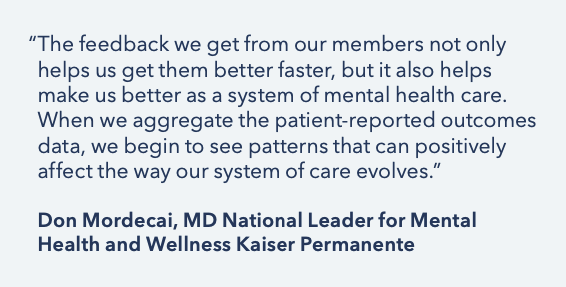
Kaiser Permanente uses a collaborative model of care to deliver mental health and addiction care services.
This measurement-based approach, called feedback informed care (FIC), places the patient voice at the center of decision-making and treatment choices.
 Providers use patient-reported information to track their progress and understand their response to different treatments, supported by a computer-based outcome management system.
Providers use patient-reported information to track their progress and understand their response to different treatments, supported by a computer-based outcome management system.
When clinicians are properly trained in this method and patients regularly provide feedback, this approach improves mental health outcomes.
How it works:
At each visit, patients fill out the FIC questionnaire, which includes a depression screening tool known as the Patient Health Questionnaire-9 (PHQ-9).
Patients are also asked questions about anxiety levels and productive functioning, in addition to three questions related to the patients’ treatment experience.

These “goodness of fit” questions ask whether patients feel their therapy is focused on what is most important to them (treatment goals), whether they agree with the approach to their care (treatment method), and whether they feel understood and respected by their clinician (therapeutic bond).
The computer-based outcome management system then tallies the responses to create a distress score for each patient.
 The higher the score, the more pronounced the patient’s symptoms, and the greater the feeling of distress.
The higher the score, the more pronounced the patient’s symptoms, and the greater the feeling of distress.
These scores can be displayed on a patient dashboard, allowing the patient and provider to better understand progress over time (Figure 1 above).
This information also allows the therapist and patient to identify changes that might improve their therapeutic relationship and assess whether to continue a current therapy or change treatment.
Over time, they can assess how the patient responded to those changes.
Where Feedback Informed Care began
Kaiser Permanente’s implementation of FIC first began in California and is now part of care across all our regions.
During the initial implementation, patients in therapy for mental health conditions completed 85% of questionnaires during their visits, resulting in 50,000 completed questionnaires per month.
Providers in every Northern California department of mental health participated, and over 1,500 clinicians received intensive FIC training.
Clinicians led weekly case consultation groups to deepen the level of FIC expertise among therapists in their departments.
From 2022-23, patients completed over 256,000 assessments in specialty mental health.
 Kaiser Permanente physicians and therapists believe that FIC can be part of an effective strategy that elevates the patient’s voice and increases engagement in the care process.
Kaiser Permanente physicians and therapists believe that FIC can be part of an effective strategy that elevates the patient’s voice and increases engagement in the care process.